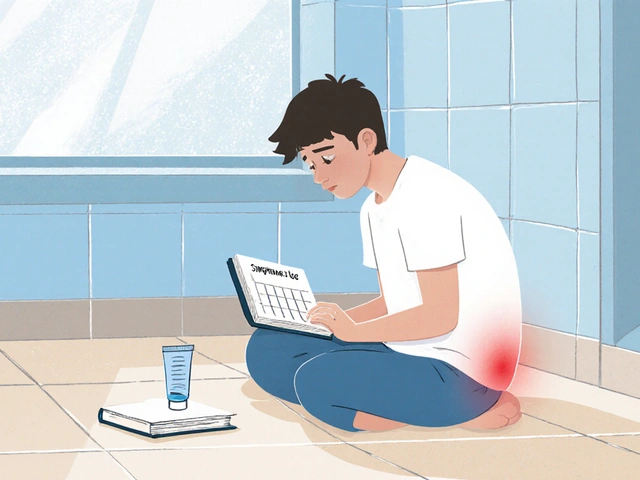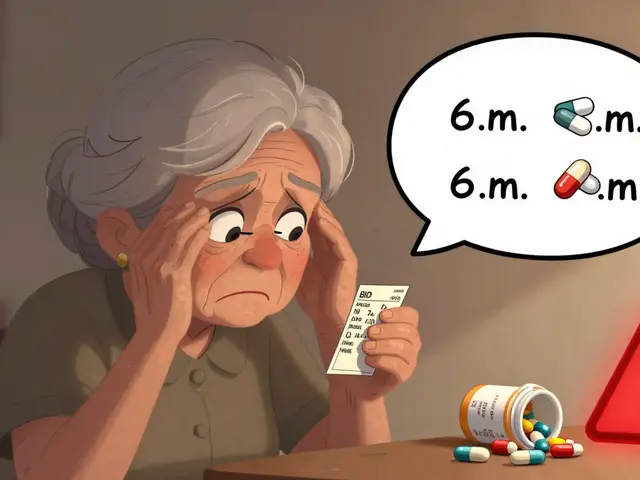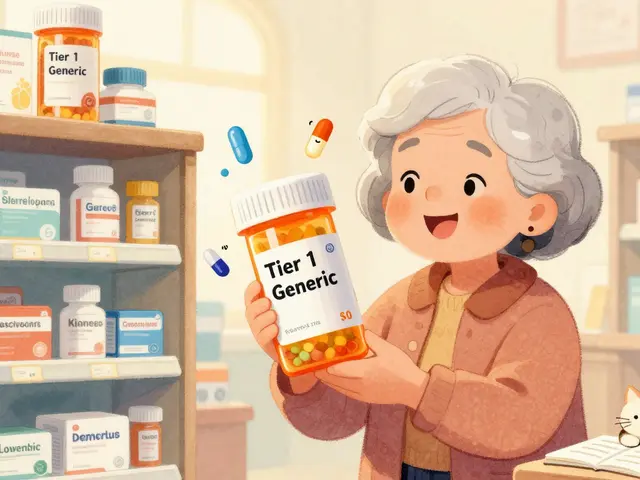
Dealing with anal itching is uncomfortable and often embarrassing, but you don’t have to suffer in silence. Knowing when the itch signals a simple irritation and when it calls for a professional can save you time, stress, and prevent complications. This guide walks you through the most common causes, tells you which type of clinician to see, and gives practical tips for getting the right care.
Key Takeaways
- Most anal itching cases are minor and treatable at home, but persistent or severe symptoms need a specialist.
- Choose a provider based on the likely cause: skin conditions point to a dermatologist, while gastrointestinal issues point to a gastroenterologist or proctologist.
- Ask about insurance coverage, telemedicine options, and what to expect at the first visit.
- Prepare a clear symptom history and bring any over‑the‑counter products you’ve tried.
- Follow‑up care is crucial for chronic or recurring itching.
Below, we break down the most common culprits behind anal itching and match each to the right kind of clinician.
Understanding Anal Itching: Common Causes
Anal itching, medically known as pruritus ani, can stem from several sources. Identifying the root cause helps you target the right treatment and the right provider.
- Hemorrhoids: Swollen veins that cause itching, pain, and occasional bleeding.
- Fungal infection (often Candida): Thrives in warm, moist areas and creates a red, itchy rash.
- Bacterial infection: Can develop after minor skin breaks, leading to pus and foul odor.
- Skin irritation from soaps, detergents, or hygiene products.
- Anal fissures: Small tears that cause sharp pain and itching during healing.
- Food sensitivities: Spicy foods, caffeine, or acidic fruits can aggravate the area.
- Dermatologic conditions like eczema or psoriasis that affect the perianal skin.
If you’ve tried simple home remedies-like gentle cleansing, over‑the‑counter hydrocortisone cream, or dietary tweaks-and the itch persists for more than two weeks, it’s time to see a professional.
When to Seek Professional Care
These red flags indicate you should book an appointment promptly:
- Itch lasting longer than two weeks despite self‑care.
- Bleeding, pain, or a noticeable lump.
- Discharge with foul smell.
- Recurring episodes after treatment.
- Associated symptoms like weight loss, fever, or changes in bowel habits.
Ignoring persistent symptoms can lead to worsening inflammation, secondary infections, or missed diagnoses of more serious conditions such as colorectal cancer.

Types of Healthcare Providers Who Treat Anal Itching
Not every clinician is equal when it comes to diagnosing and managing anal itching. Below is a quick guide to who does what.
| Provider | Typical Focus | When to Choose | Typical Visit Cost (USD) |
|---|---|---|---|
| Primary Care Physician | Initial assessment, basic skin issues, referrals | First‑line, mild symptoms, insurance‑friendly | $100‑$150 |
| Dermatologist | Skin diseases, fungal/bacterial infections, eczema | Visible rash, chronic skin conditions | $150‑$250 |
| Proctologist (colorectal surgeon) | Hemorrhoids, fissures, anorectal tumors | Bleeding, pain, suspicion of structural issues | $200‑$350 |
| Gastroenterologist | Inflammatory bowel disease, internal anal conditions | Chronic bowel changes, unexplained itching with GI symptoms | $250‑$400 |
| Telemedicine Provider | Initial triage, prescription refills, counsel | Convenient access, mild cases, follow‑up | $50‑$100 |
How to Choose the Right Provider
Here’s a quick checklist to help you decide who to book:
- Identify the likely cause. A rash points to dermatology; bleeding suggests a proctologist.
- Check insurance coverage. Primary care visits often have the lowest co‑pay.
- Consider convenience. Telemedicine can handle simple cases without travel.
- Look at expertise. Ensure the clinician has experience with anorectal disorders.
- Read reviews. Patient feedback on bedside manner and wait times matters.
What to Expect at Your First Appointment
Regardless of the specialist, the initial visit follows a similar pattern:
- Medical history review. Be ready to discuss bowel habits, diet, medications, and any recent skin products.
- Physical examination. The clinician may perform an external visual exam and, if needed, a digital rectal exam (performed with gloves and may require a drape for privacy).
- Diagnostic testing. Possible stool tests, swabs for fungal/bacterial cultures, or a small skin biopsy.
- Treatment plan. This could include prescription ointments, stool softeners, dietary changes, or a referral for a procedure.
Ask the provider to explain each step; understanding the why behind an exam reduces anxiety.

Preparing for Your Visit: Tips for Success
- Write a symptom log. Note when the itch started, frequency, triggers, and any self‑treatments tried.
- Bring previous prescriptions. Even over‑the‑counter creams have active ingredients that matter.
- List medications and supplements. Some (e.g., antibiotics) can cause fungal overgrowth.
- Know your insurance details. Have your member ID ready and ask about coverage for specialist visits.
- Prepare questions. Examples: "What could be causing my itch?" "Do I need a follow‑up?" "Are there lifestyle changes that could help?"
Follow‑Up and Ongoing Care
Most cases improve within a few weeks of targeted therapy, but chronic itching may require ongoing monitoring. Here’s how to keep things on track:
- Schedule a follow‑up 2‑4 weeks after the first visit to assess response.
- Maintain a high‑fiber diet and stay hydrated to prevent constipation, a common aggravator.
- Use gentle, fragrance‑free soaps and avoid excessive wiping.
- If symptoms return, note any new triggers and inform your provider promptly.
Frequently Asked Questions
Can I see a primary care doctor instead of a specialist?
Yes. A primary care physician can conduct an initial assessment, rule out simple causes, and refer you to a dermatologist or proctologist if needed.
Is telemedicine effective for anal itching?
For mild, uncomplicated cases, a video visit can help you get a diagnosis and a prescription quickly. Severe or ambiguous symptoms still require an in‑person exam.
How long does a typical treatment course last?
Most topical treatments are applied for 1‑2 weeks. Oral antifungals or antibiotics may run 7‑14 days, depending on the infection.
Should I avoid wiping after bowel movements?
Gentle patting with soft, unscented toilet paper is best. Over‑aggressive wiping can worsen irritation. A sit‑z bath for a few minutes can help clean the area.
When is a digital rectal exam necessary?
If there’s bleeding, a palpable lump, or suspicion of internal hemorrhoids, the clinician will perform a short, painless exam to feel for abnormalities.
Finding the right provider doesn’t have to be a guesswork game. By understanding the likely cause of your itch, matching it to the appropriate specialist, and preparing thoughtfully for your visit, you can get relief faster and avoid unnecessary trips. Remember, persistent itching is a signal-listen to it, and get the help you deserve.







Tom Green
October 18, 2025 AT 17:06When you’re dealing with that persistent itch, the first thing to do is keep a simple symptom log; note when it started, what you ate, and any creams you’ve tried. This helps any clinician quickly pinpoint whether you’re looking at a skin issue or something deeper. If the irritation is mild and hasn’t lasted more than two weeks, a gentle, fragrance‑free wash and a high‑fiber diet can often do the trick. Should the problem linger or you notice bleeding, it’s wise to schedule a visit with your primary care doctor for an initial assessment. They can then direct you to a dermatologist or a proctologist if needed.
Emily Rankin
October 18, 2025 AT 18:30Ah, the humble itch-an ancient whisper from our bodies that reminds us we are alive and, at times, remarkably fragile. In the grand theater of human experience, such sensations serve as an overture, signaling that somewhere behind the curtains a discord persists. When the pruritus ani arrives uninvited, it is not merely a nuisance but a poetic reminder that the body seeks dialogue. First, attend to the simple remedies: soft, unscented cleansing, a balanced diet rich in fiber, and avoidance of harsh soaps-these are the verses of self‑care. If those lines fail to resolve the chorus within a fortnight, the plot thickens, urging you to consult a professional. A primary care physician can act as the wise narrator, gathering your story and deciding whether the tale requires a dermatologist’s brushstroke or a proctologist’s scalpel. Dermatologists, with their mastery of the epidermal realm, can decipher fungal crescendos or eczema stanzas that masquerade as mere irritation. Proctologists, on the other hand, are the seasoned dramaturges of the anorectal stage, adept at untangling hemorrhoids, fissures, and the rarer, more ominous shadows. Do not shy away from telemedicine; for many a mild episode, a video consult can prescribe the right ointment without you ever leaving the comfort of your couch. Yet remember, the digital veil cannot replace the tactile certainty of a physical examination when blood or a palpable lump enters the narrative. Prepare your dossier-list of symptoms, dietary triggers, and every over‑the‑counter potion you’ve employed-so the clinician can read your playbook without interruption. Ask about the cost and insurance implications, for the financial subplot often influences the choice of actor in your health saga. Follow‑up appointments are the epilogues that ensure the story concludes with resolution rather than a lingering cliffhanger. In moments of doubt, remember that persistent itching is a signal, not a punishment; it beckons you toward action, toward understanding, toward healing. So, arm yourself with knowledge, choose the right specialist, and let the chapter of discomfort close, making way for a quieter, more comfortable future.
Rebecca Mitchell
October 18, 2025 AT 19:53It’s clear you’ve tried every home hack already but the itch still won’t quit. You need a specialist now.
Roberta Makaravage
October 18, 2025 AT 21:16Listening to your body is a moral imperative-ignoring that relentless itch is almost negligent 😇. A primary care physician can give you the basic clearance, but if the problem persists you must upgrade to a specialist. Dermatologists are the custodians of skin health, while proctologists handle the deeper, structural concerns. Telemedicine is a convenient shortcut, yet it’s not a substitute for a thorough examination when risk factors are present. Remember, untreated pruritus ani can mask serious conditions, and we all have a duty to avoid such reckless ignorance. 📚💡 Always check your insurance beforehand; financial surprises are the hidden villains in healthcare. And don’t forget to document every symptom-you’ll thank yourself later when the doctor asks for details.
Lauren Sproule
October 18, 2025 AT 22:40Hey there! i totally get how haggy that itch can be, it’s sooo annoying. keep things simple – use gentle soap, a lot of fiber, and try to avoid harsh wipes. if it keeps coming back after a couple weeks, i’d say book a visit with your PCP first, they’ll point you to the right doc. also, double check your insurance so you dont get stuck with surprise bills. hope this helps and you get relief soon!
CHIRAG AGARWAL
October 19, 2025 AT 00:03Honestly, most of these guides just rehash the same old tip‑list. If you’re already reading this, you probably know the basics already. Still, it doesn’t hurt to remind people to see a proctologist when there’s bleeding. And yeah, telemedicine is cool but don’t rely on it for serious stuff.
Patricia Echegaray
October 19, 2025 AT 01:26Look, the real reason they push telemedicine is to keep us hooked on big tech’s data farms, while the “specialist” referrals are just a way to drain our wallets. They want us to think a simple itch is a national security threat, so we stay scared and compliant. Keep an eye on the fine print in your insurance – it’s a playground for the elite. And remember, a high‑fiber diet isn’t just good for you, it’s a subtle form of self‑control the powers that be love to promote. Stay vigilant.
Miriam Rahel
October 19, 2025 AT 02:50In accordance with current gastroenterological literature, the differential diagnosis of pruritus ani necessitates a systematic approach. While primary care physicians provide initial assessment, dermatological consultation is indicated when cutaneous manifestations predominate. Proctological evaluation becomes indispensable in the presence of bleeding or palpable masses. Telemedicine serves as an adjunct for uncomplicated cases, yet it lacks the capacity for tactile examination. It is advisable to review health insurance policy details to mitigate unforeseen expenses. Documentation of symptom chronology enhances diagnostic accuracy.
Alexis Howard
October 19, 2025 AT 04:13Everyone says see a doctor, but most cases resolve with simple hygiene tweaks. You don’t need an expensive specialist for an ordinary itch. Just stick to basic care.
RJ Samuel
October 19, 2025 AT 05:36Keep it simple and get checked if it lasts over two weeks.